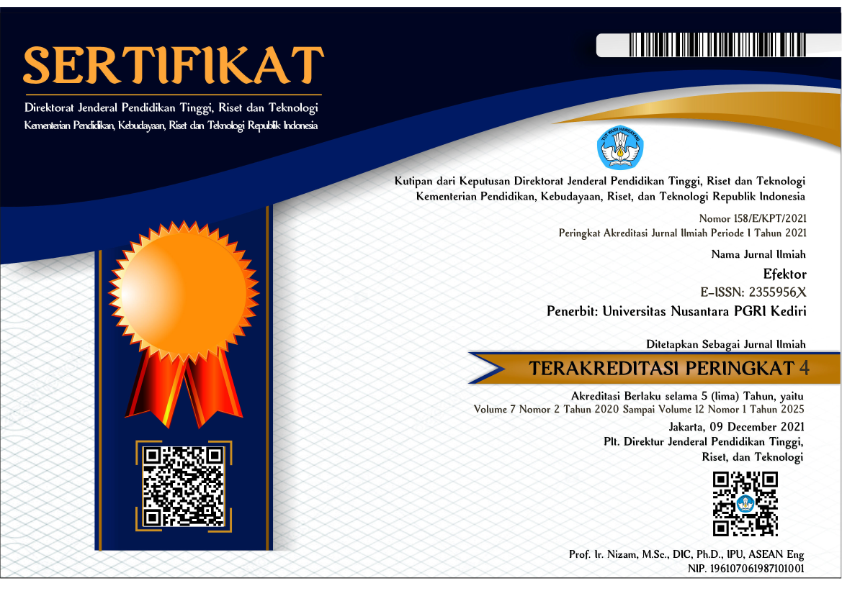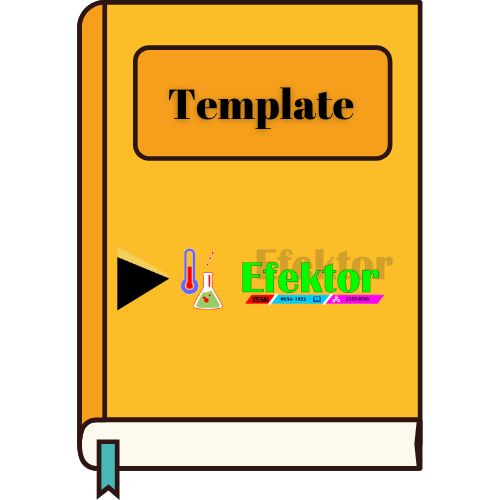Green Accounting and Its Implementation in Indonesia
DOI:
https://doi.org/10.29407/e.v7i1.14414Keywords:
green accounting, implementation, environmental costsAbstract
The growth of industrial world is an undeniable problem in the environment where industrial behavior often ignores impacts on the environment, such as water, soil, air pollution and social inequality in the environment. The purpose of this study is intended to determine the role of green accounting in reducing environmental pollution and to examine the extent to which the application of green accounting in Indonesia in supporting sustainability. This study uses an interpretive approach which focus on the subjective nature of social world and tries to understand it. Green accounting has difficulty measuring the value of costs and benefits of externalities arising from industrial processes. It is not easy to measure the loss to people around and the ecological environment caused by air pollution, liquid waste, ammonia tube leakage, nuclear tube leakage or other externalities. Unfortunately, in its application, often some companies do not report bad news they are facing, so reporting on environmental costs is not effective.
References
Abdullah, Wahyuddin. 2015. “Pengaruh Tekanan Stakeholders dan Tanggung jawab Sosial terhadap Penerapan Akuntansi Lingkungan di Kawasan Industri Makassar”. Assets. Vol. 5, No. 1, Hal. 105-114.
Aniela, Yoshi. 2012. “Peran Akuntansi Lingkungan Dalam Meningkatkan Kinerja Lingkungan dan Kinerja Keuangan Perusahaan”. Berkala Ilmiah Mahasiswa Akuntansi Vol.1, No.1, 137-149
Anggriani, R. R. 2006. “Pengungkapan Informasi Sosial dan Faktor-Faktor yang Mempengaruhi Pengungkapan Informasi Sosial dalam Laporan Keuangan Tahunan (Studi Empiris pada Perusahaan-Perusahaan yang Terdaftar di Bursa Efek Jakarta)”. Simposium Nasional Akuntansi 9, Padang
Arisandi, Desi dan Dianne Frisko. 2011. “Green Rush in Accounting Field of Indonesia From Different Perspectives”. Papers.ssrn. Vol. 3, No. 1, Hal. 137- 152.
Astuti, Neni. 2012. “Mengenal Green Accounting”. Permana. Vol. 4, No. 1. Hal. 69-75
Bartelmus, P. 2008. Measuring Sustainable Economic Growth and Development’ in C.J. Cleveland (ed) Encyclopedia of Earth http://doi.org/10.1016/j.cpa.2009.06.004
Bebbington, J. 2001. “Sustainable Development: A Review of the International Development” Business and Accounting Literature, Accounting Forum, Vol. 25, No. 3, p. 128-157
Buhr, Nola. 1998. “Environmental Performance, Legislation and Annual Report Disclosure: The Case of Acid Rain and Falconbridge”. Accounting, Auditing & Accountability Journal, Vol.11, No.2, p.163-190
Burhany, Dian Imanina. 2012. “Akuntansi Lingkungan: Dukungan Akuntansi Kepada Manajemen dalam Bisnis yang Semakin Peduli Lingkungan”. Proceedings SNEB, p.1-15
Burhany, Dian Imanina. 2014. “Pengaruh Implementasi Akuntansi Lingkungan terhadap Kinerja Lingkungan dan Pengungkapan Informasi Lingkungan. Proceedings SNEB, p.1-8
Burrit, R.L and S.Welch. 1997. “Accountability for Environmental Performance of the Australian Commonweatlh Public Sector”. Accounting, Auditing & Accountability Journal, Vol.10, No.4: 532-561
Capra, Frijof. 2002a. “Jaring-jaring Kehidupan: Visi Baru Epistemologi dan Kehidupan”. Terjemahan (Pasaribu). Fajar Pustaka Baru: Yogyakarta
Cooper, C. 1992. “The Non-and Nom of Accounting for (m)other Nature”. Accounting, Auditing & Accountability Journal Vol. 5, No. 3, p. 16-39
Deegan, C. And M, Rankin. 1996. “Do Australian companies report environmental news objectively?” Accounting, Auditing and Accountability Journal. Vol. 9, No. 2, Hal. 50-67.
Dj, Mukhtar. 2010. “Kerusakan Lingkungan Perspektif Al-Quran”. Jakarta
Dowling, J. dan J. Pfeffer. 1975. “Organizational Legitimacy: Social Values and Organizational Behaviour”. Pacific Sociology Review, Vol. 18, No. 1: 122-136
Gorz, Andre. 2003. “Ekologi dan Krisis Kapitalisme”. Cetakan Kedua. Insist Press: Yogyakarta
Greenham, Tony. 2010. “ Green Accounting: A Conceptual Framework.” International Journal of Green Economics 4(4):333–45.
Hadjoh, Rinny Amelia dan I Made Sukartha, 2013, “Pengaruh Ukuran Perusahaan Kinerja Keuangan dan Eksposur Media pada Pengungkapan Informasi Lingkungan”. E-Journal Akuntansi Universitas Udayana, Vol. 4, No. 1, p. 1-17
Hasyim. 2011. “Akuntansi Lingkungan: Apakah Sebuah Pilihan atau Kewajiban”. Jurnal.
Healy, P. 1985. “The Impact of Bonus Scheme on the Selecion of Accounting Principles”. Journal of Accounting and Economic 7 (1985) 85-107. North Holland
Hemmer, Thomas. 1988. “Performance Measurement System Incentive, and the Optional Allocation of Resonsibilities”. Journal of Accounting and Economics, 25:321-347
Idris. 2012. “Akuntansi Lingkungan Sebagai Instrumen Pengungkapan Tanggung Jawab Perusahaan Terhadap Lingkungan di Era Green Market”. Jurnal economic. Vol. 2, No. 2, Hal. 1-10
Ikbal, Muhammad. 2012. “Akuntansi Lingkungan Sebagai Instrumen Pengungkapan Tanggung Jawab Perusahaan Terhadap Lingkungan di Era Green Market”. Jurnal Economic, Vol. 2, No. 2, p.1-10
Ikhsan Arfan. 2008. “Akuntansi Lingkungan dan Pengungkapannya”. Graha Ilmu: Yogyakarta.
Kerap, A.Sonny. 2006. “Etika Lingkungan”. Kompas:Jakarta.
Lako, A. 2015b. “Berkah CSR Bukan Fiksi”. La Tofi Publishing Enterprises. Edisi Pertama
Lako, A. 2011. “Dekonstruksi CSR dan Reformasi Paradigma Bisnis dan Akuntansi”. Penerbit Erlangga: Jakarta.
Lindrianasari. 2007. “Hubungan antara Kinerja Lingkungan dan Kualitas Pengungkapan Lingkungan dengan Kinerja Ekonomi Perusahaan di indonesia”. JAAI, Vol.11, No. 2
Ljungdahl, Fredrik. 2004. “Factors Influencing Environmental and Social Disclosure”. The Fourth Asia Pasific Interdiciplinary Research in Accounting (Apira) 2004. Conference. Singapore
Lodhia, Sumit K. 2008. “Environmental Accounting in Fiji: An Extended Case Study of the Fiji Sugar Corporation”. SSRN
Meliyana, dkk. 2013. “Gerakan Lingkungan Hidup Dalam Menumbuhkan Kesadaran Lingkungan Masyarakat Belitung”. Jurnal Volume 1, Nomor 2, ISSN: 2337-5205
Peursem., K.A Van, M.J Pratt dan S.R Lawrence. 1995. “Health Management Performance: A Review of Measures and Indicators”. Accounting, Auditing & Accountability Journal, Vol 8, No.5: 34-70
Raar, Jean. 2004. “Environmental and Social Responsibility: A Normative Financial Reporting Concept”. The Fourth Asia Pasific Interdiciplinary Research in Accounting (Apira) 2004. Conference. Singapore
Riduwan, Akhmad dan Andayani. 2011. “Tanggung Jawab Lingkungan dan Peran Informasi Lingkungan dalam Pengambilan Keputusan Manajemen: Studi Kualitatif”. Simposium Nasional Akuntansi 9, Aceh
Said, Darwis. 2020. “Kearifan Lingkungaan dalam Praktik Akuntansi”. Cetakan Pertama. Tohar Media: Makassar
Soemarwoto, Otto. 2004. “Ekologi, Lingkungan Hidup, dan Pembangunan”. Cetakan ke-10. Djambatan: Jakarta
Ten, E. Eljido. 2004. “Determinations of Environmental Disclosures in Developing Country: An Application of the Stakeholder Theory”. The Fourth Asia Pasific Interdiciplinary Research in Accounting (Apira) 2004. Conference”. Singapore
Tilt, Carol A. 2004. “A Note on Linking Environmental Activity and Environmental Disclosure”. The Fourth Asia Pasific Interdiciplinary Research in Accounting (Apira) 2004. Conference. Singapore
Tischler, Len., J. Biberman, dan R. McKeage. 2002. “Linking Emotional Intelligence, Spirituality and Workplace Performance: Definitions, Models, and Ideas for Research”. Journal of Managerial Psychology, Vol. 17, No. 3, 203-218
United Nations, UN. 1993. Handbook of National Accounting System of Integrated Environmental and Economic Accounting – System of Integrated Environmental and Economic Accounting, p.198
Viller Ch. D and Ch. Staden. 2004. “Trend in Environmental Reporting: Evidence from Africa”. The Fourth Asia Pasific Interdiciplinary Research in Accounting (Apira) 2004. Conference”. Singapore
Watts, Ross. 1977. “Corporate Financial Statements, A Product of the Market and Polilical Processeses”. Australian Journal of Management, April: 53-75
Watts, Ross and Jerold Zimmerman. 1978. “Towards a Positive Accounting of the Determinant of Accounting of the Determinant of Accounting Standards”. Accounting Review, Jan: 112-134
Downloads
Published
Issue
Section
License
Authors who publish with this journal agree to the following terms:
- Copyright on any article is retained by the author(s).
- The author grants the journal, the right of first publication with the work simultaneously licensed under a Creative Commons Attribution License that allows others to share the work with an acknowledgment of the work’s authorship and initial publication in this journal.
- Authors are able to enter into separate, additional contractual arrangements for the non-exclusive distribution of the journal’s published version of the work (e.g., post it to an institutional repository or publish it in a book), with an acknowledgment of its initial publication in this journal.
- Authors are permitted and encouraged to post their work online (e.g., in institutional repositories or on their website) prior to and during the submission process, as it can lead to productive exchanges, as well as earlier and greater citation of published work.
- The article and any associated published material is distributed under the Creative Commons Attribution-ShareAlike 4.0 International License













